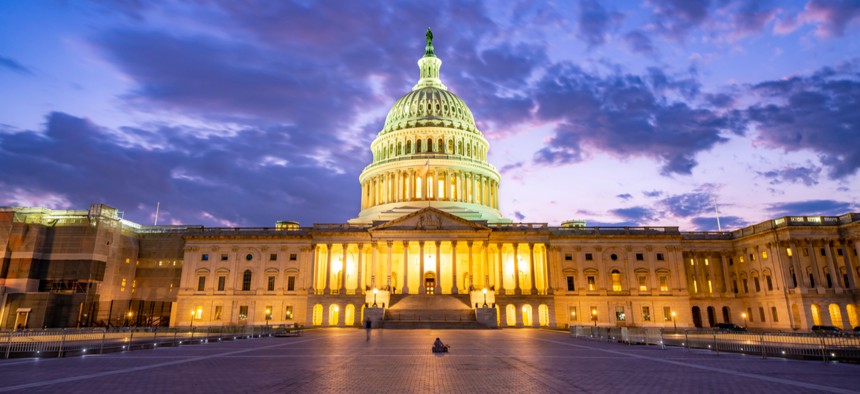
ItzaVU/Shutterstock.com
FLRA Sets Sights on Official Time for ‘Lobbying Activities’
Critics say federal labor law specifically allows employee unions to negotiate for official time in connection with presenting the union’s views to Congress.
The federal agency tasked with administering federal sector labor law on Tuesday announced that it will reexamine whether federal employee unions may receive official time to communicate with members of Congress.
In a filing set to publish in the Federal Register on Wednesday, the Federal Labor Relations Authority requested comments on whether the agency should overturn decades of precedent stating that a ban on the use of federal funds for lobbying applies to federal employees who are members of a labor union. The development is in response to a request from the National Right to Work Legal Defense Foundation, an anti-union advocacy group.
The 1918 Anti-Lobbying Act, which was last amended in 2002, prohibits “appropriated funds” from being used to petition a member of Congress without the “express authorization” of the legislature. But the 1978 Civil Service Reform Act, which governs collective bargaining in the federal government, guarantees federal workers the right to “present the views of [their] labor organization to heads of agencies and other officials of the executive branch of the government, the Congress, and other appropriate authorities.”
Since the Civil Service Reform Act allows for the use of official time “in connection with any other matter covered by this chapter,” subject to collective bargaining negotiations, unions may negotiate with agencies to afford official time for its bargaining unit members to contact members of Congress.
For decades, the FLRA and other federal agencies have made a distinction between “direct” and “grass roots” lobbying—personally contacting a member of Congress is fair game for federal employee union members on official time, but not encouraging members of the public to shift public opinion.
“In its request, the foundation asks the FLRA to issue a general statement of policy or guidance holding that Congress did not expressly authorize the use of appropriated funds for union lobbying activities through the statute, and, therefore, the statute does not permit parties to bargain over, or union representatives to use, official time for lobbying activities that are subject to [the Anti-Lobbying Act],” the FLRA wrote.
National Treasury Employees Union National President Tony Reardon decried the FLRA’s action, accusing it of serving as a vehicle by which anti-union groups make an end-run around Congress, which has thus far been unwilling to implement their policy proposals.
“The FLRA correctly decided 23 years ago that employees acting as union representatives should receive official time to present the views of union members to Congress, just as Congress had expressly provided for in the law,” he said. “Congress and agency officials make decisions that determine employees’ pay, benefits and other working conditions. It is in the public interest for employee representatives to weigh in, to help ensure those decisions are informed decisions, and to do so on official time.”
Robert Tobias, director of business development at American University’s Key Executive Leadership Program and a former NTEU president, said that if the FLRA moves forward with this proposal, it would abandon its long tradition of being a primarily judicial, not policy-setting, body.
“The FLRA, like all administrative bodies are supposed to, is obligated to abide by the rule of law,” Tobias said. “And the rule of law in this case is incredibly clear. ‘I don’t like the statute’ is not a basis for ignoring the statute, which I believe the FLRA would be doing if they reverse this case.”
Tobias said Tuesday’s filing could represent a significant departure for the FLRA’s jurisprudence. Traditionally, the agency has declined requests to issue general statements of policy, instead opting to weigh in only on concrete disputes between a labor union and a federal agency. After denying a slew of similar requests last year, the FLRA recently moved forward with a controversial effort to make it easier for federal workers to cease paying union dues.
“There were some very early requests [after the FLRA’s founding] for these kinds of policy pronouncements, but they were rejected in favor of deciding these kinds of issues on a case-by-case basis, so that an appropriate context could be defined for decisions,” Tobias said. “So far, they haven’t provided any real rationale for rejecting that policy, from what I’ve read. It’s just not designed, I think, to be a policy-creating entity, but rather more of a judicial entity.”







